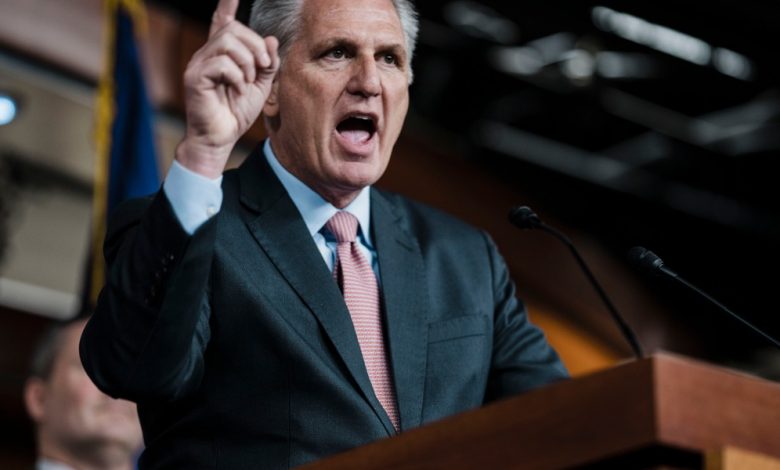Kevin McCarthy is elected Speaker of the House after four days of Republican power struggles

Republican Kevin McCarthy achieved his long-held ambition to become speaker of the House early Saturday after crushing a rebellion by conservative GOP hardliners, but at the cost of further weakening his precarious position within a sharply divided party.
After the longest run of speaker elections since 1859, McCarthy had 216 votes in the final tally, enough to be elected to the post second in line to the presidency, with six votes “present.” The Democrats unanimously cast their votes for their leader, New York Rep. Hakeem Jeffries.
The protracted deadlock between mainstream Republicans and hard-line Conservatives took 15 votes over more than four days to resolve. And it predicts further chaos over the policy challenges ahead this year, including raising the US debt ceiling and government funding.
The final vote was preceded by dramatic moments in the House of Representatives as the Republican fight escalated to shouting and physical altercations. After being blocked on the 14th ballot, a stunning and humiliating defeat, McCarthy quickly went to the back of the House of Representatives and confronted Florida’s Matt Gaetz, one of his harshest critics.
Gaetz had delayed his vote until the very last moment when it would be crucial. He then voted “present,” which left McCarthy just short of victory. McCarthy’s ally, Mike Rogers, rushed over to Gaetz to speak, but was held back by Representative Richard Hudson.
Gaetz seems to accuse McCarthy of something and points his finger at him. McCarthy finally left nervously, without the voice he needed, as a stunned house watched it unfold.
Donald Trump, whose previous support of McCarthy failed to sway his opponents, made a last-minute pitch. Colorado Republican Ken Buck said the former president called members in the hall.
Until the Speaker was elected, the House of Representatives could conduct no other business, and there are no rules governing the day-to-day operations of the 434 House legislatures and their staffs. After Saturday morning’s vote, returning and newly elected lawmakers were finally sworn in and ready to vote on a set of rules outlining how the House will function.
McCarthy, a California Republican, prevailed after days of intense negotiations and a series of humiliating defeats. He had to relinquish considerable authority and pledged to support procedural changes that would empower dissidents, including the ability for a House of Representatives to force a single Republican to oust him as speaker.
He also gave in to calls from tax conservatives to use the federal debt ceiling as leverage to force spending cuts and cap fiscal 2024 spending across government to 2022 levels, which would mean significant cuts to many programs. Both increase the risk of a market-shattering showdown with the Democrat-controlled Senate and President Joe Biden.
McCarthy’s bid for the Speaker’s Gavel has been in trouble since the election, which saw the GOP fall far short of expectations for a so-called red wave that would give them solid majorities in both the House and Senate.
They’ve won the House of Representatives, but that’s where the struggle for leadership of a party is at its liveliest. Republicans are divided between members from swing districts who must court independent voters and hard-line conservatives with secure seats who have embraced Trump’s populist agenda.
Perhaps the most consequential concession McCarthy made was a rule change that allowed a single disaffected Republican to initiate a vote to impeach him at any time.
The tide began to turn in McCarthy’s favor as he and dissidents worked out the outlines of the deal, with 15 of the holdouts switching votes to support him during Friday’s 12th round of voting.
McCarthy had said he expected the speaker election would be a multi-round process as a faction of ultra-conservatives made their demands for more power. He swore he wouldn’t back down.
“I have no problem getting a record for most votes as a speaker,” he said before voting began.
McCarthy had to wait until two of his supporters returned to the Capitol to vote on Friday. New Representative Wesley Hunt of Texas was away to meet his newborn child and Representative Ken Buck of Colorado left Thursday with a medical matter.
This is the second time McCarthy has encountered roadblocks over an offer for a speaker. When Ohio Republican John Boehner resigned as Speaker and resigned from the House in 2015 after dealing with rebellions by conservative Republicans, McCarthy, who was first elected to the House in 2012, was widely viewed as the favorite to replace him. But he relented in the face of opposition from this conservative faction.
McCarthy, 57, spent much of last year winning over a faction of Conservatives who have had a list of grievances about Home Rule, anger at compromises with Democrats and a lack of confidence in the Californian’s claim to conservative credentials.
Arizona Representative Andy Biggs, one of the leaders of the revolt, said earlier this week that McCarthy “has a history that puts some people off”. He voted against McCarthy on the 14th ballot, but switched to present on the 15th and final.
Like most House speakers, McCarthy comes to the job with a vast fundraising network. He raised nearly $26.5 million last cycle, more than any other member of the House of Representatives. And the McCarthy-backed Congressional Leadership Fund Super PAC raised nearly $260 million. Of the 20 hardliners who opposed McCarthy in the first 11 ballots for speaker, 14 of the resisters received a portion of the largest amount from McCarthy’s fund.
But, remarkably, some of McCarthy’s most ardent critics — including Reps. Lauren Boebert of Colorado and Matt Gaetz of Florida — received no funding from McCarthy’s PAC.
Our new weekly Impact Report newsletter explores how ESG news and trends are shaping the roles and responsibilities of today’s leaders. Subscribe here.



